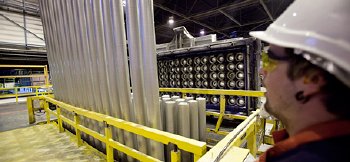A very successful merger. This is how most people would characterize the new company - Hydro Aluminium - born in Norway 25 years ago, on September 1, after the merger with ÅSV. It was the day that brought to life a Norwegian aluminium giant with a strong base in the European market.
Hydro's aluminium business has developed significantly over the past 25 years, since the ÅSV merger in 1986, through acquisitions, partnerships and growth. Hydro is today a focused aluminium company with operations throughout the value chain, from bauxite mining to the sale of aluminium products.
 GLOBAL: Hydro is today one of the important players in the global aluminium industry and in aluminium markets everywhere. The ÅSV merger in 1986 was key to Hydro's development as an aluminium group. (Photo: Kåre Foss)
GLOBAL: Hydro is today one of the important players in the global aluminium industry and in aluminium markets everywhere. The ÅSV merger in 1986 was key to Hydro's development as an aluminium group. (Photo: Kåre Foss)
Exciting story
An interesting story lies behind the creation of Hydro Aluminium AS in 1986.
In truth, there were not two, but three partners who joined forces in 1986. Just prior to the merger between Årdal og Sunndal Verk (ÅSV) and Norsk Hydro's Aluminium Division, Hydro acquired five extrusion plants in Europe from Alcan. It was from these various pieces that a new Hydro Aluminium culture was created.
These were companies that completed each other. ÅSV had extensive knowledge in electrolysis technology. Hydro had a more commercial organization that also invested heavily downstream. The acquisition of the Alcan plants virtually doubled Hydro's extrusion operation and gave the new company a solid foothold in the European extrusion industry.
Politics and industry
Hydro and ÅSV had been talking together for a long time - years - before the merger became fact. In 1982, stuck with rock-bottom metal prices, many aluminium producers suffered a crisis year. One was ÅSV, the Norwegian state-owned company that lost share capital and needed an injection of new money from its owner. Two years later, however, producers experienced a golden year with top prices. The fluctuations were enormous.
At the same time, many in Norway's political environment were voicing their desire to see the domestic aluminium industry come together in a larger and more powerful unit.
ÅSV's challenge was to secure market access. As a result, its board of directors decided in December 1985 to look into a solution that would achieve a certain level of ownership integration with West Germany's Vereinigte Aluminium-Werke (VAW). Such a solution would provide ÅSV with solid footing in the emerging European Federation and create a powerful industrial company in Europe. But the scheme attracted no great enthusiasm in some of the political camps in Norway.
A group of union officials then stepped in, taking the initiative for Norway's Minister of Industry, demanding a last attempt with Hydro to achieve a Norwegian solution. Håkon Sandvold of ÅSV and Torvild Aakvaag of Hydro - the top executives of the two companies -had been in contact with each other the whole way. Sandvold also sat on Hydro's board of directors.
The Industry Minister contacted the companies, and, in early 1986, things started happening fast. When the matter came up in Norway's Parliament the same spring, there was broad political agreement regarding a merger between ÅSV and Hydro's Aluminium Division.
The agreement was approved.
Hydro's Aluminium Division was merged debt-free into ÅSV. This gave Hydro an interest of 70 percent in Hydro Aluminium AS, with the state owning the remaining 30 percent. At the same time, the state owned 51 percent of Hydro.
Later, Hydro used its option to buy the remaining shares from the state, thereby making Hydro Aluminium AS into a wholly owned subsidiary.